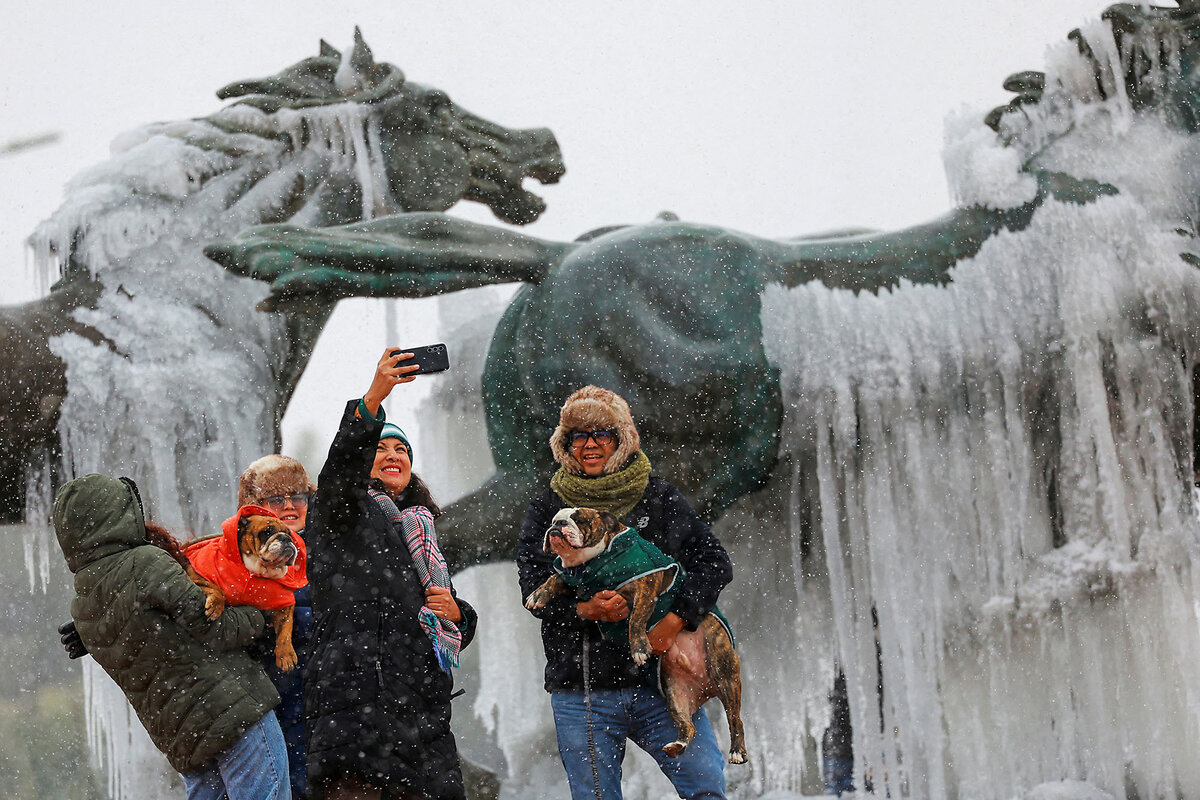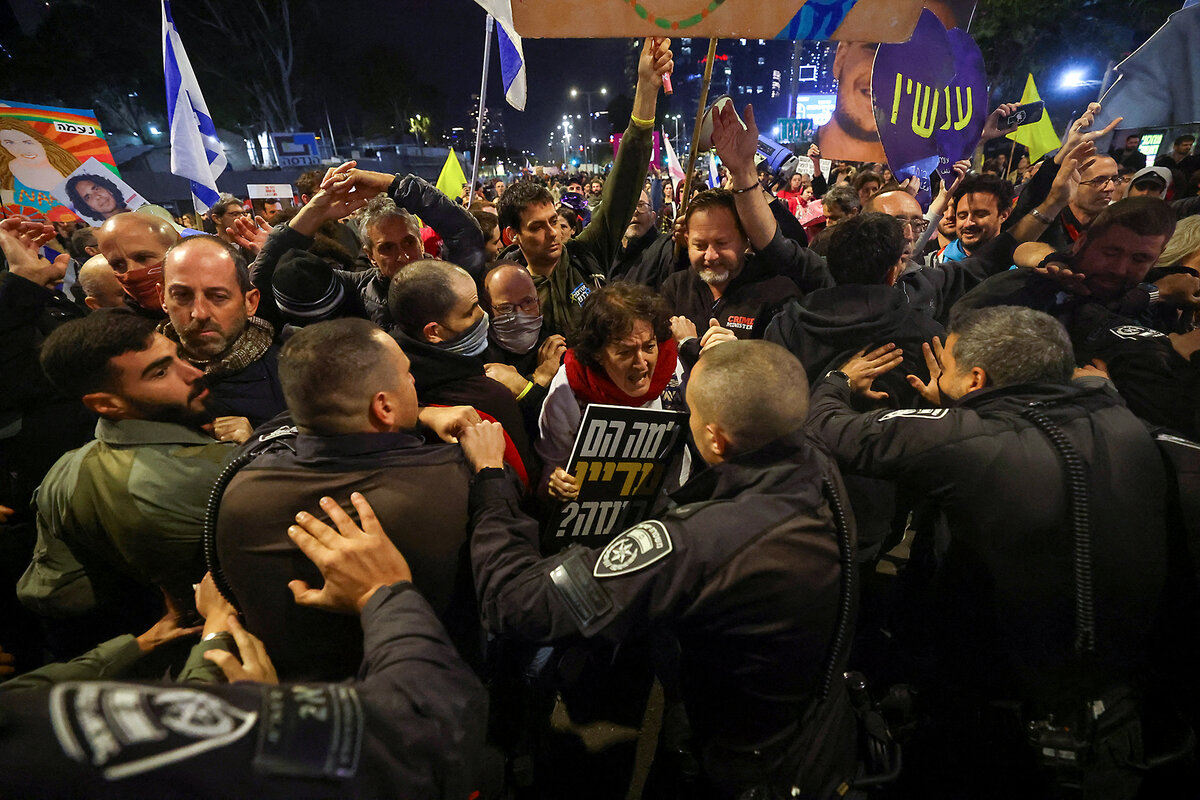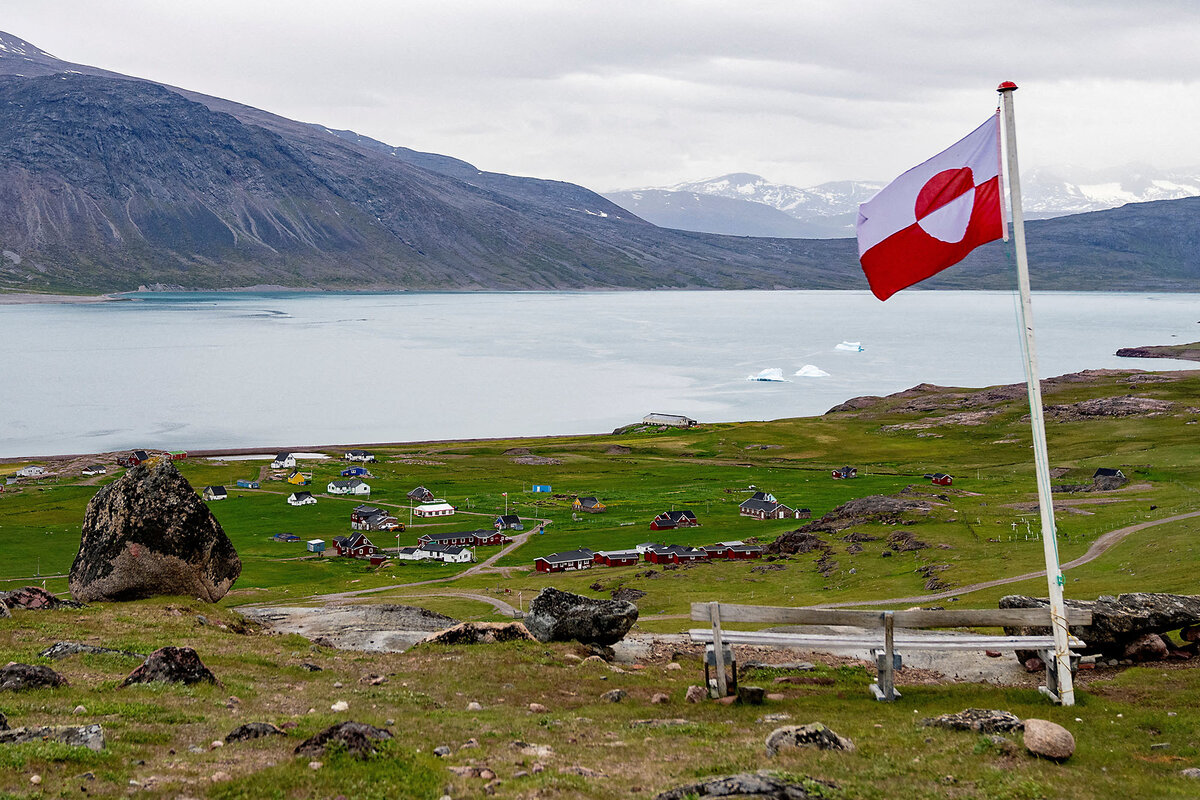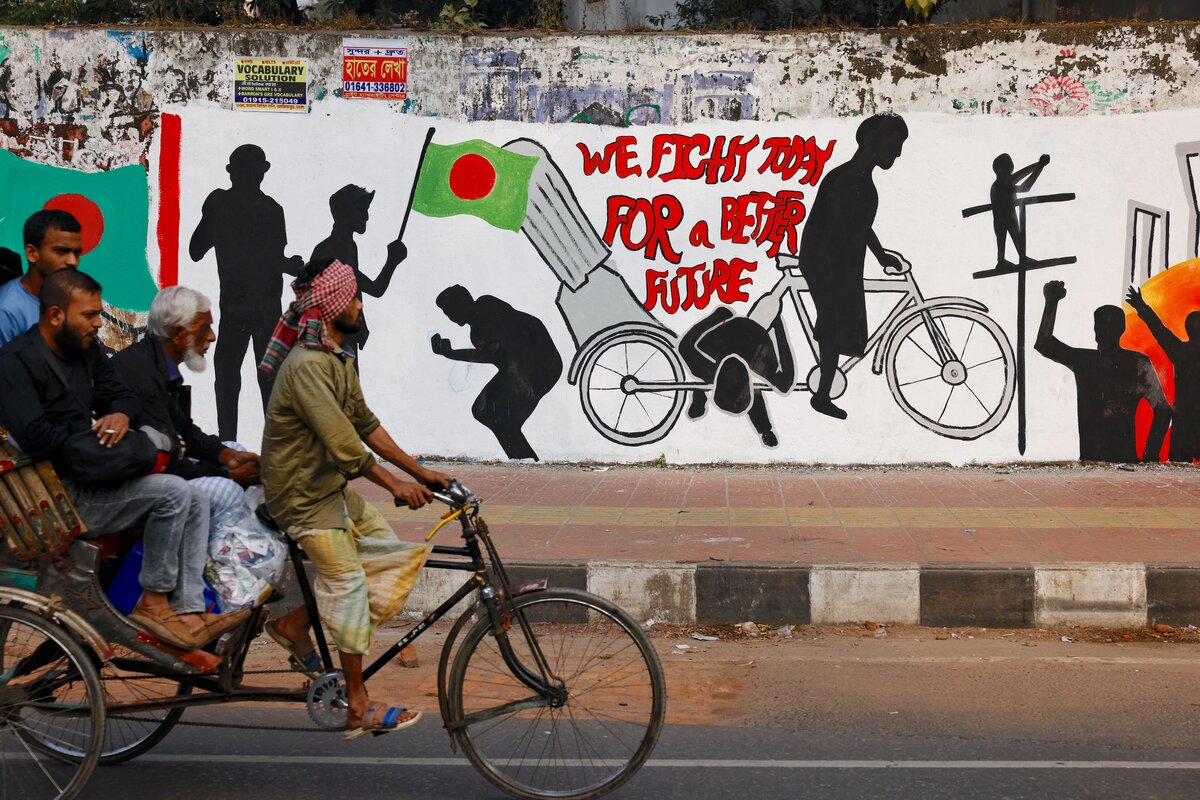• Trump role in dockworker deal: A tentative labor deal forestalls possible trade disruptions at three dozen U.S. ports. Both sides in the talks credited President-elect Donald Trump with clearing the way for a deal on automation.
• Biden migrant decision: About 600,000 Venezuelans and more than 230,000 Salvadorans already living in the United States under Temporary Protected Status can legally remain another 18 months, the Department of Homeland Security says.
• Venezuela inauguration: Venezuelan President Nicolás Maduro is sworn in for a third six-year term despite international condemnation of his recent reelection as illegitimate.
• Romanian protest: Thousands of Romanians rally outside the country’s top court to protest the December cancellation of the presidential election in which a little-known pro-Russian candidate won the first round.
• Earth passes warming threshold: Global temperatures in 2024 hit yet another record level, temporarily pushing Earth past an increase of 1.5 degrees Celsius since the late 1800s, which was set as a limit by the 2015 Paris climate pact.

Why is Christian Science in our name?
Our name is about honesty. The Monitor is owned by The Christian Science Church, and we’ve always been transparent about that.
The Church publishes the Monitor because it sees good journalism as vital to progress in the world. Since 1908, we’ve aimed “to injure no man, but to bless all mankind,” as our founder, Mary Baker Eddy, put it.
Here, you’ll find award-winning journalism not driven by commercial influences – a news organization that takes seriously its mission to uplift the world by seeking solutions and finding reasons for credible hope.
Explore values journalism About usMonitor Daily Podcast
- Follow us:
- Apple Podcasts
- Spotify
- RSS Feed
- Download
 Mark Sappenfield
Mark Sappenfield
A political scientist in Dina Kraft’s story about the Israeli police makes a fascinating point. She defines politicization as “ending the notion of expertise.” What that means, she says, is that “One cannot be a professional.” Instead, “You are always being asked, ‘Which side are you on?’”
We all would do well to consider that point. The defining political trend of this moment, particularly in the United States, is the triumph of partisan identity over logic and common cause. Realizing that, however, makes the solution plainer.
Already a subscriber? Log in
Help fund Monitor journalism for $11/ month
Monitor journalism changes lives because we open that too-small box that most people think they live in. We believe news can and should expand a sense of identity and possibility beyond narrow conventional expectations.
Our work isn't possible without your support.
News briefs
Today’s stories
And why we wrote them
( 6 min. read )
Popular support for the Palestinian Authority, which governs the West Bank, has been in steady decline. Now the authority is taking on a major militant stronghold in a bid to burnish its credentials. Yet the high-risk move is further dividing Palestinian society.
( 6 min. read )
How central is an independent police force to democracy? In Israel, the politicization of the national police is seen as part of the hard-line government’s revived judicial overhaul program, which sparked a mass pro-democracy protest movement.
( 6 min. read )
The judge in Donald Trump’s hush money case sentenced the president-elect to an “unconditional discharge.’’
The Explainer
( 5 min. read )
President-elect Donald Trump’s idea to acquire Greenland comes as the Arctic region grows in strategic importance for economic and military reasons. He’s already meeting resistance.
Podcast

Reporting on animals, learning about love: One reporter’s journey
Research suggests that animals possess richer inner lives than many people might care to consider. Might that inform how our relationship will evolve? A Monitor writer went deep, and then joined our podcast to talk about how she approached her reporting, and about what she came away with.
A Kingdom of Empathy?
Books
( 3 min. read )
Our reviewers’ picks for the 10 best books of January include a novel set in postapocalyptic New York, a travel writer’s meditation on silence, and a study of Muslim influences on European church architecture.
The Monitor's View
( 2 min. read )
Since the fall of a brutal dictator in Bangladesh last July, the interim government set in its place has insisted that the task of reinventing society belongs to the people. This week it put that ideal to work.
On Tuesday, officials dispatched eight venerated local movie directors throughout the South Asian country to mentor a new generation of filmmakers. Remembering Monsoon Revolution – a reference to the student-led movement that ousted Sheikh Hasina after 15 years of hard reign – is the first of seven initiatives meant to forge a new sense of nationhood through art and archiving.
The focus on cultural production underscores that rebuilding nations involves more than organizing elections or fixing broken economies. One of the most effective tools for stitching societies back together is storytelling.
“The establishment of a cultural bridge is crucial after the revolution,” said Mostofa Sarwar Farooki when placed in charge of the Ministry of Cultural Affairs in November. “We want to ensure that Bangladesh represents everyone – many people, many religions, many languages, and all cultures will be at the center of our policy.”
The goal of the film initiative is to produce two documentaries and six fiction stories by the end of May. The other initiatives will engage musicians, cartoonists, writers, painters, and stage actors, resulting in concerts, exhibitions, and collaborative albums. A digital oral history project will gather the individual stories of ordinary citizens.
Stirring public dialogue with art has helped other societies restore trust and empathy by encouraging independent thinking and deep listening across divided communities. In Bosnia-Herzegovina, storytelling enabled “people to explore different ways to deal with difficult wartime memories, to challenge dominant historical narratives, and to question conventional concepts of identity,” wrote Nerkez Opačin, a research fellow at the Royal Melbourne Institute of Technology in Australia, in 2015.
In Somalia, the United Nations has helped turn poets into peacemakers. “Poetry has the power to connect people on a deep, emotional level,” one young performance poet, Zahra Abdihagi, said in a U.N. interview last July. “It provides a safe and expressive outlet for people to process their trauma, share their stories, and work towards forgiveness and understanding.”
The launch of the film project in Bangladesh this week coincides with a vibrant public debate among students, teachers, and others over the drafting of a proclamation on the meaning of the July revolution and the kind of society that should emerge from it. Their vibrant civic engagement offers a model for countries in similar states of transition, such as Syria and Sri Lanka.
“The July revolution presented us an opportunity to rebuild,” Mr. Farooki, a filmmaker himself, told Variety magazine this week, to “move towards a beautiful, democratic society where there is freedom of expression, fair justice for all and no corruption.”
A Christian Science Perspective
Each weekday, the Monitor includes one clearly labeled religious article offering spiritual insight on contemporary issues, including the news. The publication – in its various forms – is produced for anyone who cares about the progress of the human endeavor around the world and seeks news reported with compassion, intelligence, and an essentially constructive lens. For many, that caring has religious roots. For many, it does not. The Monitor has always embraced both audiences. The Monitor is owned by a church – The First Church of Christ, Scientist, in Boston – whose founder was concerned with both the state of the world and the quality of available news.
( 1 min. read )
If we’re facing a threat, we can find comfort, freedom, and security as we trust that God is protecting and loving us.
Viewfinder

A look ahead
Thank you for joining us this week. Among the stories we’re working on for next week: In Columbus, Ohio, police are rethinking how to manage unruly crowds. Their “dialogue unit” could become a model for other U.S. cities.
Also, a quick note: Thursday’s story on the ongoing political crisis in South Korea has been updated to clarify polling data.









